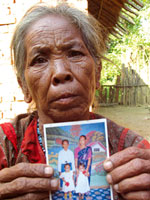|
|
"They say the two armies are going to be one now, maybe that is why no one ever comes to ask about us anymore," says 30-year-old Harimaya Magar, who hasn't seen her husband since soldiers came to the house and took him away one night five years ago.
Hari Bahadur Magar was accused of carrying weapons for the Maoists and was disappeared along with six others from Titrigachi in Sunsari.
Hari's 70-year-old mother, Padamkumari, watches television all the time just in case her son appears on the screen. She goes to all Maoist rallies hoping to catch a glimpse of him.
Harimaya's son Nishan was born after his father disappeared and has never seen him. The five-year-old says: "Daddy has gone to Dharan, he will bring me clothes and biscuits."
Machindra Limbu lives next door from the Magar household and his only son, Uttam, was taken away the same night as Hari.
|
|
After five years with no answers, Machindra joined the Maoist-affiliated Limbuwan Liberation Front and was fully engaged in campaigning during the elections. "I campaigned for the Maoists because I wanted them to win, so they'd let me know what happened to my son," he told Nepali Times.
Machindra is also the secretary of the Society of the Families of the Disappeared in Sunsari. Uttam's mother Dhanmaya attended all the Maoist campaign rallies, not so much to show support but hoping against hope that she may catch a glimpse of her son.
Besides Hari and Uttam, at least 19 other young men from Sunsari were disappeared during the conflict. Only six of them are known to have been killed.
Families of the disappeared have nearly given up hope, but many just need to know whether their sons and husbands are alive or dead. With the Maoists\' election victory, they hope they will finally be told.
Officially, there are 1,100 cases of disappeareds all over Nepal, but human rights organisations say the number may be double that. Activists and families are both worried that despite talk about a Truth and Reconciliation Commission, the warring sides will try to sweep past atrocities under the carpet.
|
|
"We have gone and staged sit-ins in Kathmandu, we went to the army, we went to the Maoists, no one has shown any interest in finding my son," says 82-year-old Mankumari Bhandari, whose son Pushpa was a Maoist trade union activist in Itahari before he was disappeared in 2003.
Most of the disappeareds were also the sole salary earners of their families who are now destitute. Besides their psychological trauma, many now face economic hardships.
"For many of these families, it would actually be a relief if they were told that their relatives died," says psychiatrist Pramodmohan Syangbo, "without closure, they are forced to grieve every day."
Somraj Thapa is with the human rights group, INSEC, and says there is no exact figure for the total number disappeared in the eastern region. He says: "The fact that the state and the former rebel forces have shown no interest in telling the truth proves they are guilty of human rights violations."





